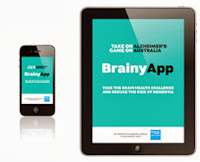
Chair Exercise Program
PRODUCT OF THE WEEK: This chair-exercise set comes with two DVDs. One has a stretching routine, the second has strength and balance exercises. Great for

PRODUCT OF THE WEEK: This chair-exercise set comes with two DVDs. One has a stretching routine, the second has strength and balance exercises. Great for
PRODUCT OF THE WEEK: Easy to set up and simple to use, Med-E-Lert ensures medications are taken properly and on-time. A long-duration buzzer sounds continuously

PRODUCT OF THE WEEK When caregiving puts you on your feet all day, you’ll find Timberland PRO Slip-On Clogs provide the utmost support you could

PRODUCT OF THE WEEK with MOVIE TRAILER: ‘Quartet’ is the type of movie that will have you laughing at one moment while perhaps inducing tears

VIDEO & ARTICLE BrainyApp enhances brain & heart health. See how it helps reduce the risk of developing dementia. Download a free copy to your

ON AMAZON.COM People with dementia are comfortable with traditional telephones. At the same time, today’s smartphones are helpful to people with dementia in so many

The Pix-Star FotoConnect is the biggest and best in the family of successful Wi-Fi & email photo frames. With the ability to receive photos sent

VIDEO & ARTICLE “I love my iPhone” are words on the lips of many a good person. Find out why their enthusiasm for the new

Did you know? Intellectual abilities are increased in the brain by an average 300% in most people ages 60-80.

Dietary iron is an essential element in the brain. That’s why it is critical to understand how it affects Alzheimer’s. Researchers used advanced X-ray techniques to take a giant step forward in understanding iron chemistry in amyloid plaque, the main culprit behind Alzheimer’s. Learn more about their exciting new insights.

A deep promise to be there for an Alzheimer’s parent, this heartwarming song was written as a tribute to families facing dementia.

Researchers in Florida find that robotic pet cats improve mood, behavior and cognition in older adults with mild to moderate dementia. Find out more.

Ketone-rich diets increase the SIRT3 protein that protects neurons from death during the progression of Alzheimer’s disease. But how does it work? Find out more.

Memory failing? New research shows you may need help, but not for dementia. Memory slips, stress and fatigue are growing in people with healthy memory.

People worry about becoming forgetful. Is it the first sign of Alzheimer’s or just the passing years? After all, forgetfulness is a normal part of aging. Check out these quick ways to tell the difference.
No spam, only news and updates.


